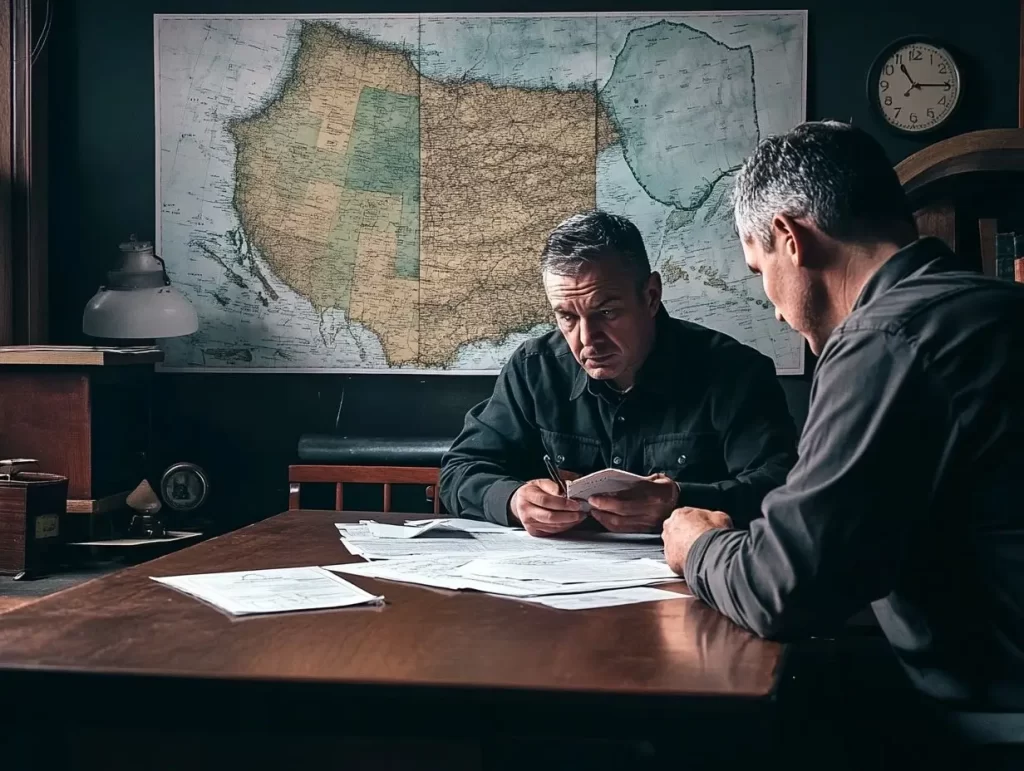Navigating the legal system can feel pretty overwhelming, especially when you’re trying to wrap your head around bail bonds in Washington state.
In Washington State, understanding the bail process is super important for getting released from jail after an arrest. This guide on how bail bonds work in Washington goes into detail of what Washington state bail bonds are all about, walks you through the step-by-step process of securing one, and explains the different types of bonds available.
How Bail Bonds Work will break down the costs involved with bail and highlights key things defendants and cosignors should keep in mind. Whether you’re dealing with a legal situation or just looking to learn more, our bail guide gives you the lowdown on how bail bonds work in Washington State.
Overview of Washington State Bail Bonds

Bail bonds are basically financial guarantees that let you get out of jail while you wait for your trial, making sure you stick to your legal responsibilities. If you find yourself in Washington State, it’s important to know that the bail process is guided by specific laws and regulations, which you definitely want to understand if you’re involved in the criminal justice system.
These bonds usually require you to provide collateral or a surety bond to cover the bail amount set by the court. Plus, having a licensed bail bond agent on your side can really help you navigate the whole process smoothly.
Definition and Purpose of Bail Bonds
Bail bonds play a vital role in the criminal justice system by helping you or a loved one secure temporary release from jail while making sure you show up for future court appearances. Think of a bail bond as a contract between the bail bond company and the court, letting you post bail without needing to cough up the full cash bail amount right away.
This setup really eases the financial strain on you and your family, giving you a shot at freedom while you wait for your trial. Typically, you’ll pay a premium, which is just 10% of the total bail amount set by the court.
The perks of going this route are twofold: it not only takes some of the stress off you during a tough time but also boosts your chances of preparing a solid defense while you’re out of jail. Saving money on your Kings County bail can help you afford a decent lawyer, get your car out of police impound and more.
The Bail Process in Washington State
How bail bonds work in Washington state is simple; it starts with you getting arrested and wraps up with a bail hearing. This is where the court decides on bail conditions and bail amounts using a Washington state bail bond schedule
It’s super important for you and your family to understand this process, as it shapes your path through the criminal justice system. Knowing how it works helps you explore your options for pretrial release, including applying for bail and following any specific conditions set by the court.
Arrest and Booking
The arrest and booking process is your first step into the criminal justice system, where you’re detained and your rights are documented. This crucial phase involves the actions of the officers, the collection of your personal information, and informing you of your rights, which sets the stage for the bail process.
Understanding these rights is super important because they ensure you’re treated fairly and legally throughout the proceedings. During this stage, you should be made aware of your right to remain silent and your right to have legal representation. It’s essential to grasp what it means to waive these rights, as it can have a big impact on your situation moving forward.
Recognizing all these elements is key to navigating the larger bail process, which ultimately decides if you can secure your release while waiting for your trial.
Bail Hearing and Setting Bail

During a bail hearing, the court looks at a bunch of factors to figure out the right bail amount for you. It’s not just about how much cash you can cough up; they also consider your ties to the community, any past criminal history, and what the current charges are.
Judges take their time to evaluate all these pieces to see how likely you are to show up for future hearings and whether you might be a risk to public safety. Things like your job status, family ties, and how serious the alleged offense is can really sway their decisions.
They might even impose certain conditions for your release, like mandatory check-ins with a probation officer, travel restrictions, or requiring you to go through substance abuse treatment. This helps manage any risks while still giving you some freedom before your trial.
Posting Bail and Release from Jail
Posting bail is your ticket to securing your release from jail, and it often involves a bail bond service to help with the financial guarantees. You’ll go through a process where you create a bail agreement that lays out the conditions of the bond and spells out everyone’s obligations, including what the cosigner needs to do, if there is one.
Once the bail is set, the bail bond service will take a look at your situation and might ask for a fee, which is usually a percentage of the total bail amount, as collateral. This agreement acts like a financial contract, making sure you’ll show up for your scheduled court appearances. It can also include specific rules, like travel restrictions or check-ins.
For you, posting bail in Washington is a big opportunity to regain your freedom while waiting for your trial. This can really ease the stress for both you and your family. Plus, being out on bail allows you to prepare your defense better and helps keep things as normal as possible in your personal and professional life during this tough time.
Types of Bail Bonds
There are several types of bail bonds out there in the bail bond industry, and each one has its own quirks: cash bail, surety bonds, and property bonds. Being clear on the differences between these options is crucial for you and your family.
Each type comes with its own costs, collateral requirements, and conditions for getting released from jail, so knowing what you’re dealing with can really make a difference.
Cash Bail, Surety Bonds, and Property Bonds
Cash bail means you or your family need to cough up the full bail amount in cash. On the flip side, with surety bonds, a licensed bail bondsman steps in to guarantee the bail for a premium fee. Then there are property bonds, which let you use real estate as collateral to secure your bail, definitely adds a different layer of financial commitment.
Each of these options comes with its own costs and implications:
- Cash bail requires an upfront payment of the full amount set by the court, which can really hit hard, especially if you’re working with limited resources.
- Surety bonds usually charge a premium fee, around 10% of the total bail amount, making them a more budget-friendly option for many people. Just keep in mind that this fee is non-refundable, even if your case gets dismissed.
- Property bonds can look appealing if you have valuable real estate, but they come with legal processes that could put your property at risk if the defendant skips out on court. Understanding these nuances is crucial if you’re navigating the bail process.
Costs and Fees Associated with Bail Bonds

Understanding the costs and fees connected to bail bonds is really important for you and your family to manage your financial obligations during this stressful time.
From the bail premiums set by bond companies to any potential collateral requirements, being informed about these expenses can help you stay on top of court demands.
Premiums, Collateral, and Additional Expenses
Bail premiums are usually a percentage of the total bail amount, and they play a crucial role in the bail bond process. If you’re dealing with higher bail amounts, you might need to provide collateral to secure the agreement.
Getting a handle on these premiums can really affect your financial situation. Often, you’ll find that you need to offer collateral, like property or valuable assets, to snag a bail bond. This requirement acts as a safety net for the bail bond agent and adds a layer of legal responsibility for you as the defendant. Plus, be ready for additional expenses that might pop up—think legal fees and potential court costs—which can unexpectedly weigh on your wallet.
These factors not only highlight how important it is to manage your finances during this tough time but also remind you of the legal consequences that can follow if you don’t meet your obligations.
If my bail in Seattle is $150,000, how much should I pay?
We get questions about bail prices all the time and how bail bonds work in Washington. To help calculate your bail, we’ve set up a simple bail schedule. Below is a simple table to help you better understand the premium rates for bail. Here, we will calculate bail using a standard of 10%:
| CASH BAIL AMOUNT | PREMIUM % | BAIL COST |
|---|---|---|
| $1000 | 10% | $100 |
| $5,000 | 10% | $500 |
| $10,000 | 10% | $1,000 |
| $20,000 | 10% | $2,000 |
| $50,000 | 10% | $5,000 |
| $100,000 | 10% | $10,000 |
| $150,000 | 10% | $15,000 |
| $250,000 | 10% | $25,000 |
| $500,000 | 10% | $50,000 |
| $1,000,000 | 10% | $100,000 |
Important Considerations for Bail Bonds
When you’re dealing with bail bonds in King County, it’s crucial for you and your family to keep some important things in mind to avoid any hassles and stay in line with court orders.
Understanding the conditions of bail, the potential consequences if you violate it, and what responsibilities you have as the defendant is key to making sure you have a smooth pretrial release.
Conditions of Bail and Consequences of Violation
Conditions of bail can really vary, from regular check-ins with bail bond agents to travel restrictions. It’s super important for you to understand these conditions to avoid any bail violations. If you violate them, you not only risk your release but could also face bond forfeiture and even new criminal charges.
You should be aware that you might need to avoid certain activities, stick to a curfew, or even steer clear of specific people. Each of these rules is in place to make sure you show up in court and don’t pose a risk to public safety.
With the potential consequences, like having your bail revoked or facing more legal issues, getting legal advice is key.
A good attorney can help clarify your responsibilities, making sure you’re crystal clear on what’s expected of you while you’re out on bail.
Frequently Asked Questions About Washington State Bail Bonds

What are bail bonds and how do they work in Washington State?
Bail bonds are a type of financial guarantee used to secure the release of someone who has been arrested and is awaiting trial. In Washington State, a bail bond is a contract between a bonding company, a defendant, and the court. The bonding company agrees to pay the full bail amount if the defendant fails to appear in court as required.
How does a bail bond differ from posting bail directly to the court?
When someone posts bail directly to the court, they are paying the full bail amount set by the judge in order to be released from custody. However, with a bail bond, the defendant only needs to pay a percentage of the bail amount (usually 10%) to the bonding company, and the company covers the full amount if the defendant fails to appear in court.
What is the process for obtaining a bail bond in Washington State?
The first step is to contact a licensed bonding company. They will ask for information about the defendant, including their name, charges, and bail amount. The defendant or a co-signer will then need to provide collateral or pay a bail bond premium to the bonding company. Once the bond is posted, the defendant will be released from custody.
Are bail bonds available for all types of charges in Washington State?
Yes, bail bonds can be used for all types of charges, from minor misdemeanors to serious felonies. However, the court may deny bail for certain crimes, such as capital offenses, if there is a high risk that the defendant will flee or pose a danger to the community.
What happens to the bail bond if the defendant fails to appear in court?
If the defendant fails to appear in court as required, the bail bond is forfeited and the bonding company is responsible for paying the full bail amount to the court. The defendant and any co-signers may also be liable for additional fees and expenses incurred by the bonding company.
Can a bail bond be revoked or canceled in Washington State?
Yes, a bail bond can be revoked or canceled if the defendant violates the terms of their release, such as failing to appear in court or committing another crime while out on bail. In these cases, the defendant may be re-arrested and the bond may be revoked, meaning the Washington licensed bonding company is no longer responsible for the defendant’s bail.
Can you pay for bail with EBT card?
No. You cannot use EBT cards or cash withdrawn from an ATM by EBT cards as payment for bail. Any bail bond company owner with an ATM in their office must have the EBT function disabled.


